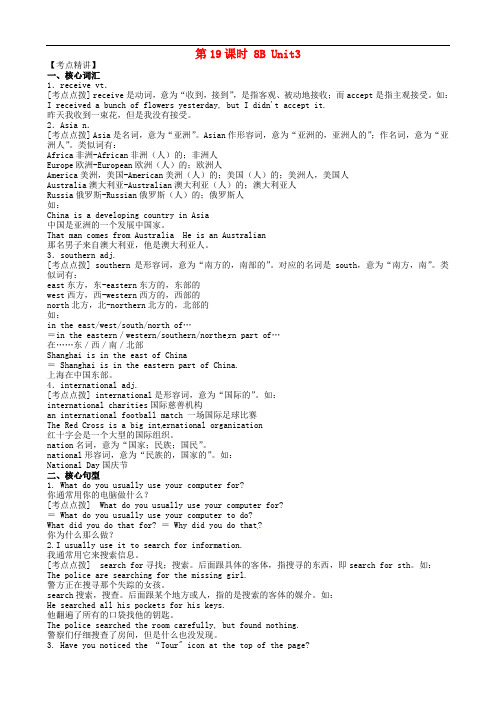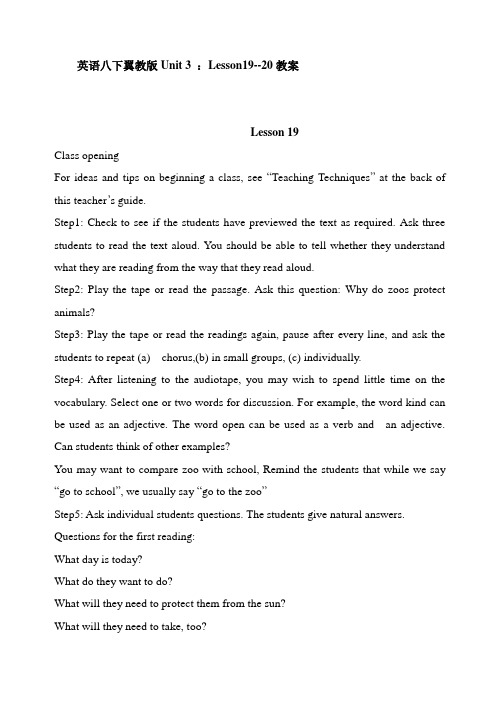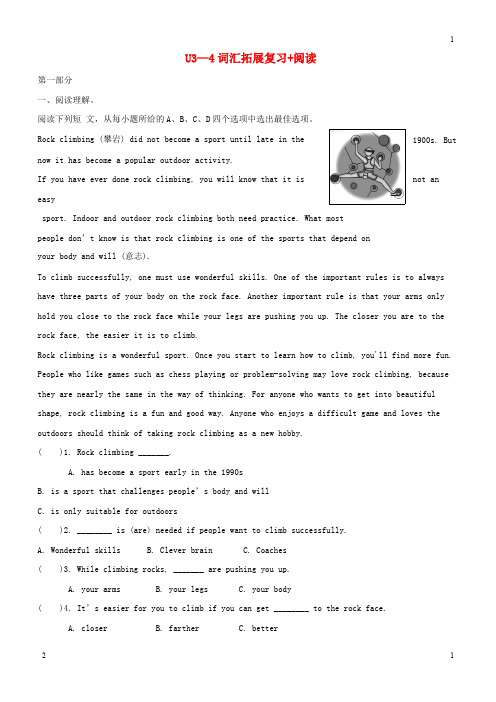江苏省中考英语复习课本考点第19课时八下Unit3复习学案9 (2)
- 格式:doc
- 大小:55.50 KB
- 文档页数:7
![江苏省邳州市辐山中学九年级英语第一轮复习教案第19课时[牛津9A Unit3]](https://img.taocdn.com/s1/m/cce64305bb68a98271fefa2f.png)
第19课时Unit 3 [Book9A]重点词汇:1. teenage adj.→ ________ (n.)2. choose v.→ ________ (n.)3. wake v.→ ____________ (adj.)4. suggest v.→ ________ (n.)5. value n.→ ________ (adj.)6.worry v.→ ______________ (adj.)7. pronounce v.→ _____________ (n.)8.correct adj.→ ________ (adv.)重点短语:1. 吃得太多________________2. 处理,对付________________3. 有足够的睡眠________________4.有足够的时间做某事________________________5. 使某人发狂________________6. 更好地安排某人的时间_______________________7. 熬夜________________8.值得做某事________________9. 待在户外________________10.主动给某人提供一些建议__________________________11. 使我们的生活更加有趣_________________________12.对某人要求严格________________13. 除了做某事别无选择______________________14. 在……与……之间达到___________________________15.嘲笑________________16.以……为自豪________________17.称某人为书虫________________18.复习________________19. 在……方面取得进步________________20.正确地读出所有的单词__________________________21. ……的原因________________22.在表达某人自己方面有困难______________________23. 根据;按照________________24.与某人同龄________________25.醒着________________26.显得更加高兴___________________27. 算出;解决________________28.不客气________________重点句型:1.为什么不少吃点儿,多锻炼呢?________________ and exercise more?2. 或许你应该更好地安排你的时间,早点儿睡觉。


第19课时 8B Unit3【考点精讲】一、核心词汇1.receive vt.[考点点拨] receive是动词,意为“收到,接到”,是指客观、被动地接收;而accept是指主观接受。
如:I received a bunch of flowers yesterday, but I didn't accept it.昨天我收到一束花,但是我没有接受。
2.Asia n.[考点点拨] Asia是名词,意为“亚洲”。
Asian作形容词,意为“亚洲的,亚洲人的”;作名词,意为“亚洲人”。
类似词有:Africa非洲-African非洲(人)的;非洲人Europe欧洲-European欧洲(人)的;欧洲人America美洲,美国-American美洲(人)的;美国(人)的;美洲人,美国人Australia澳大利亚-Australian澳大利亚(人)的;澳大利亚人Russia俄罗斯-Russian俄罗斯(人)的;俄罗斯人如:China is a developing country in Asia中国是亚洲的一个发展中国家。
That man comes from Australia He is an Australian那名男子来自澳大利亚,他是澳大利亚人。
3.southern adj.[考点点拨] southern是形容词,意为“南方的,南部的”。
对应的名词是south,意为“南方,南”。
类似词有:east东方,东-eastern东方的,东部的west西方,西-western西方的,西部的north北方,北-northern北方的,北部的如:in the east/west/south/north of…=in the eastern/western/southern/northe rn part of…在……东/西/南/北部Shanghai is in the east of China= Shanghai is in the eastern part of China.上海在中国东部。

英语八下翼教版Unit 3 :Lesson19--20教案Lesson 19Class openingFor ideas and tips on beginning a class, see “Teaching Techniques” at the back of this teacher’s guide.Step1: Check to see if the students have previewed the text as required. Ask three students to read the text aloud. You should be able to tell whether they understand what they are reading from the way that they read aloud.Step2: Play the tape or read the passage. Ask this question: Why do zoos protect animals?Step3: Play the tape or read the readings again, pause after every line, and ask the students to repeat (a) chorus,(b) in small groups, (c) individually.Step4: After listening to the audiotape, you may wish to spend little time on the vocabulary. Select one or two words for discussion. For example, the word kind can be used as an adjective. The word open can be used as a verb and an adjective. Can students think of other examples?You may want to compare zoo with school, Remind the students that while we say “go to school”, we usually say “go to the zoo”Step5: Ask individual students questions. The students give natural answers. Questions for the first reading:What day is today?What do they want to do?What will they need to protect them from the sun?What will they need to take, too?Questions for the second reading:Where did zoos keep all kinds of animals years ago?Is it good for all kinds of animals to live?What do the today’s cages look like?Zoos protect animals , don’t they ?Why?Why should we protect animal’s wild habitats?What are zoos doing now?Step6: Divide the class into groups of three. Ask each group member to be one of the three roles. First they play out the text by reading aloud the actual lines. Practice until students know the lines without looking at the text. Ask one or two groups to demonstrate or act out the dialogue in front of the class. If time permits, go on with the role-play. This time, the students can improvise their own lines.Step7: Come to “project 2”Begin unit project2. This project can cover three lessons. Instruct students to write a story about a trip to the zoo they have taken or would like to take, the story can be real or imaginary. They should illustrate their stories with in pictures or photographs. Students may continue working on their stories during the next two lessons.Allow students to continue working on their stories. Remind them that they will have one more lesson to complete their stories.Divide the class into small groups . Within the groups, have students take turns presenting their stories to each other.If the project cannot be finished in one lesson, it can be continued in the next lesson. Class closingThe third reading in the readerThe remaining activities in the activity bookThe next reading in the student bookLesson 20Class openingFor ideas and tips on beginning a class, see “Teaching Techniques” at the back of this teacher’s guide.Step1: Check to see if the students have previewed the text as required Ask if they have any questions. Encourage other students to try to answer the questions. Have one or two groups of students role-play the speech bubbles.Step2: Spend a little time on the vocabulary for this lesson. Do not explain the vocabulary independently from the text. Rather, help the class understand the meanings and uses of the vocabulary from the context in which they appear in the song. This will in turn help the class understand the meaning of the song.Step3: Then have the class read the lyrics aloud as a poem. Since the lines are long, students need to read the lines well before they are able to sing themStep4: Play the audiotape. Ask the students to read the lines silently while listening to the audiotape. Play the audiotape again. This time have the class sing along.Step5: Make sure everybody can sing confidently. If time permits, you may have a volunteer sing alone.Step6: Come to “Let’s Do It”Class closingThe remaining activities in the activity bookThe next reading in the student bookDepending on how much time you have, you may wish to end class by singing thesong “stand so still”.。

1U3—4词汇拓展复习+阅读第一部分一、阅读理解。
阅读下列短文,从每小题所给的A、B、C、D四个选项中选出最佳选项。
Rock climbing (攀岩) did not become a sport until late in the 1900s. But now it has become a popular outdoor activity.If you have ever done rock climbing, you will know that it is not an easysport. Indoor and outdoor rock climbing both need practice. What mostpeople don’t know is that rock climbing is one of the sports that depend onyour body and will (意志).To climb successfully, one must use wonderful skills. One of the important rules is to always have three parts of your body on the rock face. Another important rule is that your arms only hold you close to the rock face while your legs are pushing you up. The closer you are to the rock face, the easier it is to climb.Rock climbing is a wonderful sport. Once you start to learn how to climb, you'll find more fun. People who like games such as chess playing or problem-solving may love rock climbing, because they are nearly the same in the way of thinking. For anyone who wants to get into beautiful shape, rock climbing is a fun and good way. Anyone who enjoys a difficult game and loves the outdoors should think of taking rock climbing as a new hobby.( )1. Rock climbing _______.A. has become a sport early in the 1990sB. is a sport that challenges people’s body and willC. is only suitable for outdoors( )2. ________ is (are) needed if people want to climb successfully.A. Wonderful skillsB. Clever brainC. Coaches( )3. While climbing rocks, _______ are pushing you up.A. your armsB. your legsC. your body( )4. It’s easier for you to climb if you can get ________ to the rock face.A. closerB. fartherC. better1 ( )5. Which is the best title for the passage?A. Rock ClimbingB. Rock Climbing is Helpful to Get into Beautiful ShapeC. Rock Climbing is a Popular Sport参考答案1—5、BABAA二、短文改错。

八下U3复习教学设计一、教材分析本单元的话题是做家务,主要是关于家庭生活,谈论家庭琐事及家庭互助。
要求学生学会用“Could you please...?”和“Could I please...?”来委婉的提出请求或征求别人的许可,以及如何有礼貌的拒绝别人并表达自己的理由。
家庭生活及家务劳动是社会家庭和学生生活中的重要方面,对学生生活习惯的养成、社会行为习惯及家庭责任感的建立起着重要作。
通过本单元的学习,学生应对参加及帮助父母做适当的家务持有积极的态度。
此外,学生还将了解中西方在这方面的文化差异,增强他们在日常生活中的沟通和交流能力。
本节课的具体设计如下:1.对基础单词的复习,掌握重点单词以及短语,为接下来知识点的复习奠定知识基础。
2.以课本编排为线索,讲解课文中出现的重要句式。
讲解过程中进一步复习语法点,拓展相关知识,结合课本基础知识与课文,改变题目,直击考点,与中考题型接轨。
3.以《学考传奇》为依据,对高频考点进一步讲解,辨析难点、混淆点,并以图表、例题来进一步巩固练习。
4当堂训练部分,让在练习中进一步巩固基础知识,夯实基础。
5.作业部分让学生完成与本节课相关的单选题和阅读题。
通过阅读来提高学生的做题技巧,提高学生对知识的综合运用能力。
二、学情分析九年级的学生在中考复习中已经具备了一定的知识基础,如何将八年级的知识与初中所学英语知识相连接,形成完整的知识体系,更好的做好基础知识储备,为中考英语基础题目部分奠定基础是复习的一个重要目的。
此外,大部分九年级学生由于平时忽视且缺乏阅读能力的训练,缺乏相关的阅读技巧和策略,在平时的考试中失分严重。
因此,通过将课本重点链接中考题型,尤其是中考新题型,让学生更好的掌握阅读题做题方法与技巧,提升阅读能力,学会分析问题、理解问题进而解决问题是复习的又一重要目的。
三、教学目标(一)语言目标掌握与家务劳动有关的词汇,及如能够谈论对做家务的看法。
(二)能力目标1.通过复习基础知识,夯实基础:能写出重点单词和重点句型,同时掌握复习链接的相关拓展知识,增加知识储备。
8年级下册(U3)一、目标:1. 识记:知识梳理中的词汇、句型及重点固定搭配。
2. 理解:①掌握could用于礼貌地提出请求的用法;②能够正确运用情态动词could委婉地请求做某事。
3.运用:本单元主要学习利用这一句型,礼貌地提出请求或礼貌地请求允许做某事及其相应的答语,同时学习相关的词汇和词组。
培养礼貌地待人处事的能力,能够帮助父母做力所能及的事情。
二、重点:1. 掌握could用于礼貌地提出请求的用法;2. 能够正确运用情态动词could委婉地请求做某事。
三、难点:情态动词could表请求的用法。
四、知识梳理:(一)句型与词汇:1.Could you please sweep the floor/do the dishes/take out the rubbish/makethe bed/fold the clothes/clean the living room/do these chores/pass me thesalt/lend me some money/provide him with some food/?2.Could I/we go out for dinner with my friends/get something to drink after themovie/borrow the book/hang out with my friends/buy some snacks anddrinks/buy a shir t?3.Since they live in one house with their parents, they should know thateveryone should do their part in keeping it clean and tidy.4. I’ll finish my homework while you h elp me with the dishes.(二)语法:1. could用来提出礼貌的要求---Li Lei, could you please help me ?---Sure.---Could you close the window ?---I’m afraid not.2.could 表示请求许可Could I come in?---Could I use your bicycle?---Y es, of course you can.(三)教材中的重点固定搭配1. Would/Do you mind doing sth?你介意做......?e.g. Do/Would you mind passing me the dictionary ?Do/Would you mind me/my closing the window?= Do you mind if I close the window?2.all the time 一直,总是e.g. You wat ch TV all the time.3. neither... Nor...既不.......也不......e.g. Neither he nor I likes swimming.4.in order to 为了e.g. He got up early in order to catch the school bus.5. as soon as 一......就e.g. I’ll write to you as soon as I get there.6.depend on依靠,依赖e.g. You should depend on yourself.7.take care of照顾e.g. My mother took good care of me when I was a child.8.a waste of time浪费时间e.g. Playing computer games is a waste of time.9.finish (doing) sth完成(做)某事e.g. Jack has finished his homework./doing his homework.。
一、重点单词1.programme n. <英>节目;方案;方案2.main unit 〔电脑〕主机;主件3.mouse 或mouses) 鼠标4.screen [skriːn]显示屏,屏幕5.receive [rɪ'siːv]收到,接到6.guide [gaɪd] 导游,向导7.icon [ˈaɪkɒn] 图标8.click [klɪk] 点击 [ˈeɪʃə] 亚洲10.Africa ['æfrɪkə] 非洲11.America [ə'merɪkə] 美洲12.wordfamous 世界著名的,举世著名的13.trade [treɪd] 贸易14.southern adj. 南方的,南部的15.international adj. 国际的16.gather [ˈɡæðə]聚集,集合17.huge [hjuːdʒ] 巨大的18.darkness [ˈdɑːknɪs]黑暗19.island ['aɪlənd] 岛屿20.several ['sevərəl] 几个,数个wn [lɔːn]草坪22.musical [ˈmjuːzɪk(ə)l] 音乐剧23.pick [pɪk] 选择24.website [websaɪt] 网站25.dream of/about 幻想;想像26.passport [ˈpɑːspɔːt]护照27.coast [kəʊst] 海岸28.sail [seɪl] 帆29.Australian n. 澳大利亚〔人〕的30.opposite [ˈɒpəzɪt] 对立的人〔或物〕31.mind [maɪnd] 介意32.print [prɪnt] 打印;印刷33.my pleasure 不客气,很愿意效劳,很荣幸34.queen [kwiːn]女王35.ruler ['ruːlə] 统治者;管理者36.pound [paʊnd] 英镑37.be made up of 由…组成,用…制造(制成)38.European [jʊərəˈpiːən] 欧洲的39.dollar [ˈdɒlə] 美元二、重点词组1.换频道change the channel2.做文字处理do word processing3.收发电子邮件send and receive emails4.搜寻信息search for information5.在……的底部at the bottom of...6.在……的南端at the southern end of...7.辛勤工作一天后 a hard day’s work8.听说hear about/of...9.与……相反the opposite of...10.介意做某事mind doing sth11.有悠久的历史have a long history (动词短语〕with a long history (介词短语〕12.一个欧洲国家a European country三、依据以下句子所给汉语注释或首字母,完成词汇。
八年级下册(U9)一、目标:1. 识记:熟练识记本单元单词表上所有单词、短语和目标语言;动词过去式和过去分词的构成规则。
2. 理解:理解现在完成时的用法(二):用have/has been to ...来谈论过去的经历。
3. 运用:能够运用have/has been to ...来谈论过去的经历;4. 能运用阅读技巧Making notes更好地记住所学内容。
5. 教材中的重点固定搭配:a couple of, thousands of(hundreds of, millions of, billions of), on the one hand... On theother hand...,all year round, put up, lead to, encourage sb.to do sth., something/anything good to eat, have problems doing sth.(=have a hard time doing sth./have trouble doing st h.), during the daytime, wake up, …二、重点:1.用have/has been to ...来谈论过去的经历。
2. have/has been to ...与have/has gone to ...的区别。
三、难点:1. have/has been to ...与have/has gone to ...的区别。
四、知识梳理:1.句型与词汇:(1)词汇:重点“四会”词camera, toilet, province, spring, fox, collect, encourage, fear, progress, rapid, peaceful, perfect, safe, unbelievable, unusual, social, whenever, whether,“四会”词itself, German, ride, thousand, simply, Ind ian, Japanese, mostly,“三会”词amusement, amuse ment park, somewhere, invent, invention, tea art, performance, tea set, theme, equator, location(2)句型:① --Have you ever been to a science museum?--Yes, I’ve been to a science museum./No, I’ve never been to a sciencemuseum.② --Have you ever visited the space museum?-- Yes, I have. I went there last year./ No, I haven’t.③ --I’ve been to the art museum many times.--Me, too. And I’ve also visited the nature museum.④ --I’ve never been to a water park.--Me neither.⑤ --Hav e you ever been there?--Yes, I have./No, I haven’t.⑥ --Where is your English teacher?--He’s (=He has) gone to Beijing for a meeting. He will be back in three days.2. 语法:现在完成时的用法(二):Have/has been to & have/has gone to的区别:He has been to Beijing. 他曾去过北京。
第19课时 Book 8下 Unit 3Teaching aims:*熟悉并掌握有关计算机的词汇,理解计算机不同部件的功能。
*理解并掌握一般过去时和现在完成时的区别。
*根据Reading对纽约的介绍学会介绍别的地方。
Teaching procedures一、Warming up二、Review the important points一)、Words1.receivev.意为“收到”,receive是非延续性动词,用于现在完成时,跟表示一段时间的状语连用时要注意转换。
注意receive与accept区别:receive是被动接受,不管愿不愿意都得接受。
accept是主动接受,自己愿意;如:He received the present,but he did not accept.2.Asia n.—Asian adj. Africa n.—African adj. Europe n.—European adj. merica n.—American adj.如:Oxfam Trailwalker is organized by Oxfam Hong Kong to raise money for helping poor people in Hong Kong and other parts of Asia and Africa.3.huge意为“庞大,巨大的”,形容事物较多,或者常规本应该挺小的,却是很大的东西。
如:There is going to be a huge problem for us.*big“大的,巨大的”,常指程度,范围,规模,容积,重量,数量等(还可表示“伟大,重要”之意)常可与large互换,多用于具体的、有形的人或物(其反义词多为little/small。
)如:There is a big tree beside the house.She must be a big girl now.*large“大的,巨大的”,常指面积,范围,可表示数和量(当它直接用于人时,可表示身体的大),其反义词为small。
如:They say China is a large and beautiful country.*great表示“巨大、伟大、突出”等意思,一般修饰抽象名词。
如:He has made great progress.Great changes have taken place in Guilin.great也可修饰可数名词,但带有强烈的感情色彩。
如:Look at that great hole in the wall.二)、Phrases1.main unit 2.change the channel 3.search for information 4.send and receive e -mails 5.word processing 6.a tour guide 7.travel around in the world in eight hours 8.at the top of… 9.click on 10.at the southern end of… 11.the world-famous trade centre 12.international banks 13.at Times Square 14.thousands of 15.on New Year's Eve 16.the huge glass ball 17.through the darkness 18.in Central Park 19.a hard day's work 20.the early twentieth century 21.at the bottom of… 22.pick another city 23.start/take the new online tour 24.the Palace Museum 25.Mount Huang 26.travel around the world 27.the Harbour Bridge 28.be made up of 29.on the north-east coastof Australia 30.Daily English 31.see a doctor 32.prepare for e English in daily communication 34.help people buy tickets to different places中文译注:1.主机 2.换频道 3.搜索信息 4.收发电子邮件 5.进行文字处理 6.导游 7.八小时周游世界 8.在……顶部 9.在……点击 10.在……南尽头 11.举世闻名的贸易中心 12.国际银行13.在时代广场 14.成千上万的 15.在除夕夜 16.巨大的玻璃球 17.穿过黑暗 18.在中心公园 19.一天辛苦的工作 20.二十世纪初 21.在……的底部 22.挑选另一个城市 23.开始一次新的网上在线旅行 24.故宫 25.黄山 26.周游世界 27.港湾大桥 28.由……组成 29.在澳大利亚东北海岸 30.日常英语 31.看病 32.为……做准备 33.在日常交流中使用英语 34.帮助人们买票去不同的地方三)、Sentences1.Just click on it,and you can visit Asia,Africa,Europe,America and more in_only_eight_hours!“in”表示“在……时间内”。
另外,“in+段时间” 作时间状语,一般用于将来时,可以用how soon进行提问。
如:—How soon will you finish your work?—In half an hour.2.It's exciting to see the huge glass ball falling through the darkness!see sb./sth.doing sth.意为“看见某人、某物正在做某事。
”如:I saw her cleaning the window after class.see sb./sth.do sth.意为“看见某人、某物做某事”,表示看见全过程。
如:I saw Jack fly a kite in the park yesterday.through prep.意为“穿过”,指从某内部空间穿过。
如:A train is running through the tunnel quickly.3.With_several_lakes,hills and a large green lawn,it's_a_good place to relax after a hard day's work.4.It has been_famous_for its theatres since the early twentieth century.be famous for意为“因为……而著名”,后接原因。
be famous as 意为“作为……而著名”后接身份。
如:Beijing is_famous_for many places of interest.Mo Yan is_famous as a writer. 5.Would you mind showing me how to start this online tour?短语mind doing sth./mind sb's doing sth.在回答带mind 的这类问句时,如果表示“同意(不介意)”,要用No,not at all./Certainly not./Of course not.等;如果表示“反对(介意)”,常用委婉的表达Sorry,I'm afraid not./You'd better not do that 等。
四)、Grammar现在完成时(Ⅲ)一般过去时和现在完成时的区别(1)一般过去时表示过去某个时间发生的事、存在的状态或经常发生的动作。
说话的侧重点只在于陈述一件过去的事情,不强调对“现在”产生的影响。
如:He visited Guilin in 1998.他1998年参观过桂林。
(只说明去桂林的时间)I went to Beijing last month.我上个月去过北京.(2) 现在完成时表示动作发生在过去,对现在造成了影响或产生了结果。
不与确定的过去时间状语连用。
如:Jill has bought a new computer.吉尔买了一台新电脑。
(着重点是现在有了一台新电脑)I have been to London many times.我去过伦敦很多次。
(言下之意:我对伦敦较熟悉)(3)两种时态的区分一般过去时通常与表示过去的时间状语连用。
如:yesterday,last week,two years ago,just now,in 2002等;而现在完成时则常与just,already,ever,never等副词和thesedays,this week,since…,for…表示一段时间的状语连用。
第25课时 Book 9上Unit 1Teaching aims:*学会使用连词and,but,or and so 引导并列句。
*学会使用句型both…and…,not only…but(also)…,either…or… and neither…nor…*以性格为依据写一封推荐信。
Teaching procedures一、Warming up二、Review the important points一)、Words一、根据汉语提示及句意写出单词。
1.He is a __________(天生的)artist and has won many prizes in the world. 2.Life is like a __________(赛跑).You either take the lend or fall behind. 3.—Would you like some tea or some coffee?—__________(两者之一)is OK.I don't mind.4.(扬州三模)This famous university has high __________ of teaching.(标准) 5.Suzy is a careful and she always pays __________(注意)to details.6.In his __________(演讲),he mentioned the Chinese Character Spelling Contest(汉字听写大赛)several times.7.—We'd better book a standard room before we set off. —I __________(同意)with you.8.(广西贵港)Nobody was __________(缺席)from school though it rained heavily yesterday.9.(江苏无锡)Sometimes to take the __________(领先地位)is easy,but to keep it is hard.10.(泰兴三模)Any progress of that blind kid in his study is beyond __________(赞扬).二、用所给单词的适当形式填空。